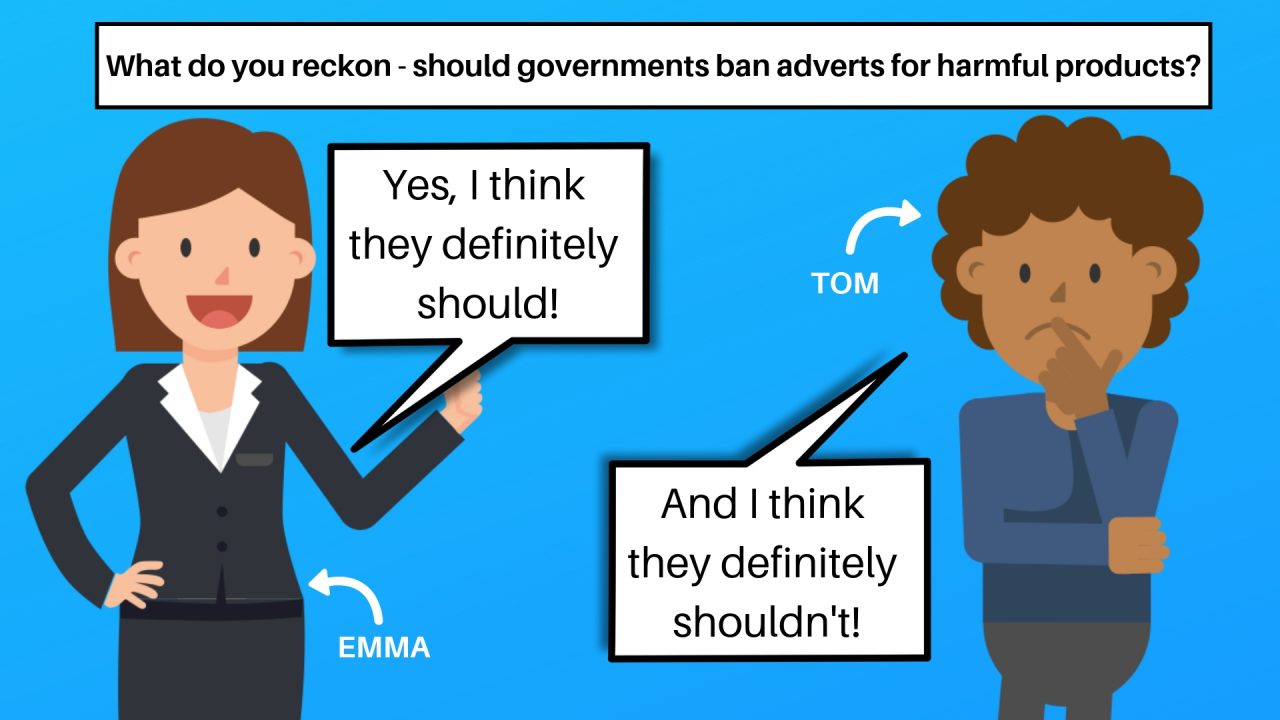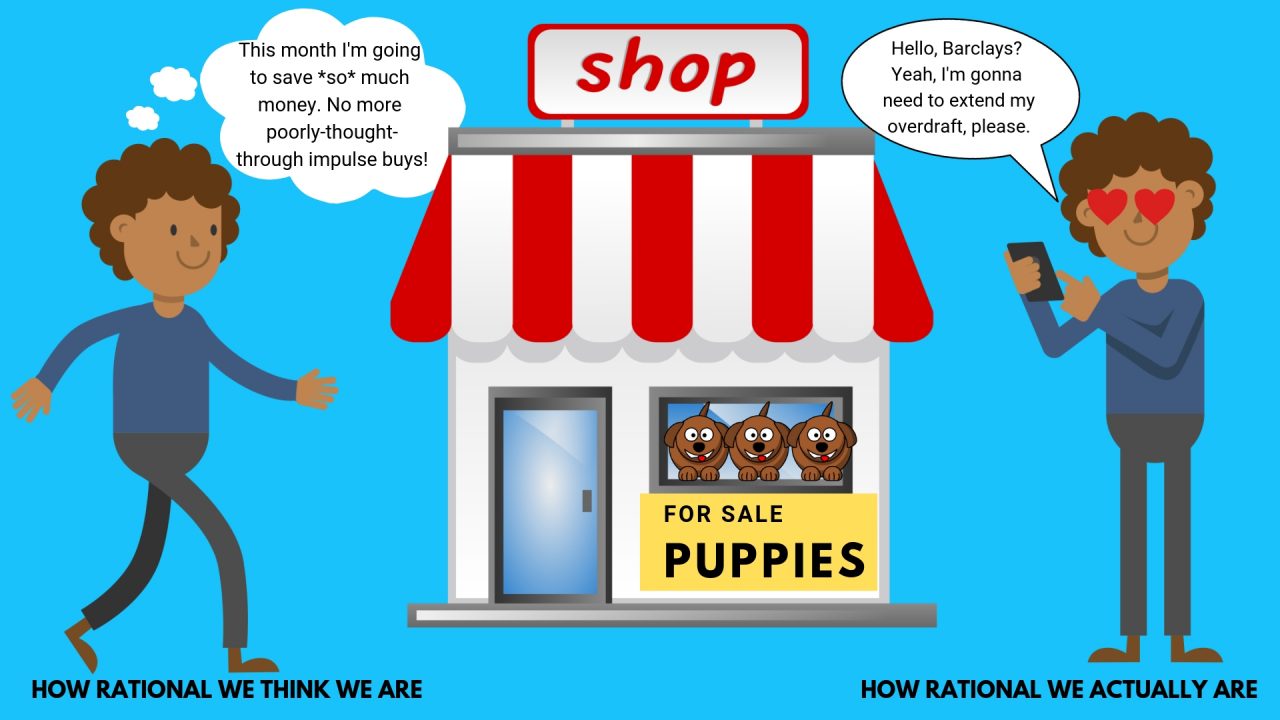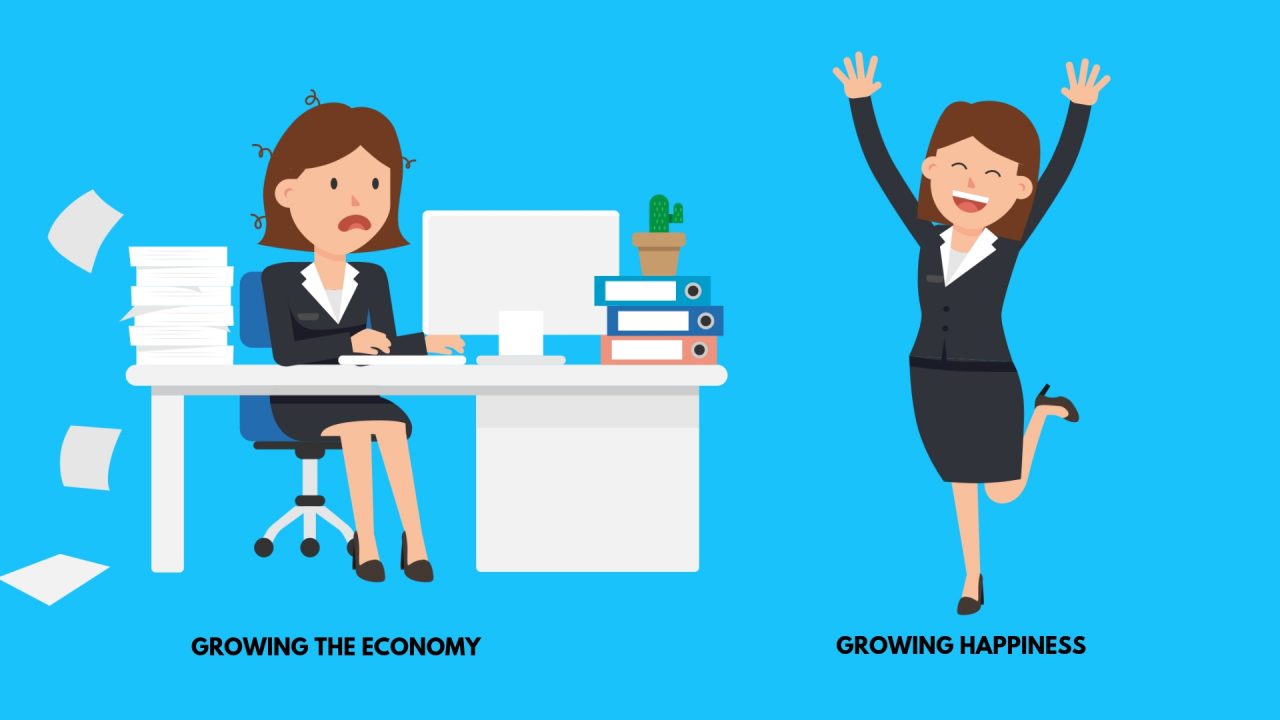
Should the government ban adverts for harmful products?
So, why are we talking about adverts?
You can probably think of a big way adverts are tied up with the economy: they (mostly) try to make us buy stuff. Economists are really interested in us buying stuff, aka being consumers. That’s because what we buy, and how much of it we buy, changes what our economies look like.
You know that blue-jumper scene in Devil Wears Prada? (If you’ve never seen that film, what the hell were you doing for all of the noughties?) In it, Meryl Streep, playing icy fashion editor Miranda Priestly, absolutely lays into on Anne Hathaway’s character for not caring which shade of blue is deemed the latest fashion trend.
"You think this has nothing to do with you," she says. "However, that blue represents millions of dollars and countless jobs.”
She’s talking about the fashion industry. But what she’s saying is also true of the economy in general. The more blue jumpers we all buy, the more blue-jumper businesses will be set up and the more people will be employed making blue jumpers. How much of our income we all spend on things like blue jumpers, and how likely we are to take out credit cards with which to buy blue jumpers, can affect what our country’s finances look like. And if we decide that each fashion season we need a different shade of blue jumper, then that’s going to have an impact on our .
Why are there rules for advertising?
Most people want to know what they’re buying. So governments usually tell businesses they can’t run adverts that lie about what they’re selling, or make exaggerated claims like saying that their product is “the best in world” (yeah, we’re looking at you, Carlsberg).
But there are some things that our governments think are so harmful that they really want us to buy less (or none) of them - things like cigarettes, alcohol, and gambling bets. So they put strict rules on how/if you can advertise those things in the hope that less people will then be tempted to buy them.
But not everyone thinks that’s a good idea.

TOM: Okay, here’s the big problem for me with governments regulating ads. Why should they get to decide what is harmful and what isn’t? Sure, most people agree that something is harmful if it causes injury or death, but as pretty much anything can be dangerous! Each year, 450 Americans die from falling out of bed - are we going to ban adverts for Dreams mattresses?
EMMA: But there are some products that everyone agrees are unquestionably harmful - like tobacco. 480,000 Americans die from smoking each year, that’s more than 1000 times as many as die from falling out of bed!
TOM: So how much injury or death does something need to cause before we consider it dangerous? Guns, for example, kill 34,000 Americans a year but can be advertised in the States. So can opioid painkillers, which killed 72,000 Americans in 2017. What about cars, which are the leading cause of death for young people?
I’m just worried that once a government starts banning adverts for one thing it’ll lead to a slippery slope where the state tries to control what we do more and more. I want a free choice to buy what I want!
EMMA: Banning adverts isn’t the same as banning products. You can still buy cigarettes in places like the UK, you just can’t advertise them. So it’s not limiting your freedom of choice at all.
TOM: Advertisements give us information that is useful to us as consumers. Without being told about all the different versions of a product out there, how am I supposed to know what I can choose from? I believe in the economic concept of : we choose to buy something based on how much pleasure (which economists call ‘utility’) we think we’ll get from it. That means we can make a rational decision about whether we value the happiness we get from something harmful more than we value the risk of something bad happening to us.
People do this all the time - like when they go skydiving or mountain biking or any other risky activity - and we usually all think that’s a fair choice to make. So why shouldn’t we see adverts for harmful things? They won’t make us any more likely to buy something.
EMMA: Lots of people don’t agree that we make economic decisions. Think about how long we’d need to think and how much we’d need to know to be able to weigh up every single potential outcome of a choice and mathematically calculate which option is the absolute best - it’s just not possible!
And because of that, we often make decisions on a whim or without really thinking through the consequences - like splurging on something we can’t afford or buying tons of unhealthy pizza when we’re hungover. So seeing an advert for something harmful might make us buy it on an impulse, without thinking through the risks properly.
TOM: That makes it sound like we have no self-control! Adverts don’t force me to buy anything. Sure, it can sound silly to say I should have the right to buy something that could kill me, but I think it’s important that people should be responsible for the consequences of their own actions. A government trying to protect everyone from themselves - a so-called ‘nanny state’ - is creepy and invasive… and a few steps away from a Big Brother society (the book, guys, not the reality TV show).
EMMA: Plenty of research shows that adverts are actually really good at making us buy things we wouldn’t normally buy. Advertising companies know how to play our cognitive biases (see box) to their advantage. That’s bad enough generally, but it’s terrible when it’s used to persuade us to buy more harmful stuff than we normally would. Being manipulated into spending money on stuff that will make me sick? That doesn’t sound like freedom of choice to me!

TOM: There’s someone else whose freedoms are being trodden on here: businesses'. Advertising is the best way they have of getting a name for themselves and winning new customers. Without advertising, companies will struggle to get started or to get bigger. And I think that having fewer businesses - or more struggling businesses - is bad for our economy. After all, big businesses hire lots of people, pay the government lots of taxes which can be spent on stuff like roads and hospitals, and invest money in areas to the benefit of everyone who lives there, right? In my opinion, helping our businesses is the best way to help our economy “ ” (i.e. produce more or more valuable stuff).
EMMA: Harmful products can have really negative effects on the economy too. Every year, the NHS spends £2.6 billion on smoking-related illness, £3.5 billion on alcohol-related disease and £6.1 billion on obesity-related ones. That’s particularly worrying considering they’re now saying that there will be a £30 billion shortfall in the NHS budget by 2020 if we can’t make some significant savings. Wouldn’t it be better to save money by having less people falling sick with avoidable diseases, rather than having to pay doctors and nurses less, or get people to wait longer for their operations?
And the of harmful habits goes beyond healthcare. People who have become sick from smoking or drinking or whatever can’t work or can’t work as much, which means the economy isn’t benefiting from their efforts and skills, and that the government has to spend more money on welfare services like disability benefits.
We can’t ban things like alcohol or tobacco outright, because that would be really unpopular (and whenever we’ve tried it people just carry on doing it illegally, look at Prohibition in the States or the drug trade now). But if banning adverts for these harmful things means less people buy less of them, that’s the next best thing.
TOM: Governments can offset these higher costs for harmful products through taxes. Buy a packet of cigarettes in the UK and 80-90 percent of the price you pay goes straight to the government as a And actually, if you want to focus just on money, then people who indulge in unhealthy habits are quite good for the public purse - because they tend to die earlier.
The UK government spends way more of its welfare budget on state pensions (£111 billion per year) than disability benefit (£44 billion) or unemployment benefits (£2 billion). And the longer people live, the more state pension they collect (it currently kicks in at 65 years of age, and the average Brit lives into their 80s).
I’m not saying the government should try and bump off loads of people by getting them into cigarettes. I’m just saying that claiming the government has the right to interfere in what we buy because our choices cost it money is a rubbish argument. Us making bad choices sometimes saves the government money!
EMMA: There's something we as economists should value above making more money or more economic growth: making people happier. And banning advertisements on cigarettes, along with other restrictions, has pushed tobacco companies to come up with safer, healthier alternatives.
For example, Philip Morris, one of the biggest, now says it wants a "smoke-free future" and has spent billions of dollars developing e-cigarettes and heated tobacco products.
These are still harmful (and addictive) but they have much less cancer-causing stuff in them than regular cigarettes. And while some people are worried that these products will get people who wouldn’t normally smoke to start, nobody’s arguing that millions of people around the world wouldn’t be healthier, and therefore happier, if they switched from cigarettes to one of these alternatives.
So you could say government regulation sometimes gives people better choices: now people who enjoy nicotine don’t have to choose between giving it up and having a really, really high a chance of getting cancer.

And in conclusion?
Like most economic issues, there’s not a right or wrong answer here: it depends on how you feel and what you value. But here are some things to help you make up your mind.
- Would you prefer to be as free as possible or as safe as possible?
- Do you think it’s your government’s job to help you make 'good' decisions?
- How much do you think adverts influence us?
- Do you think most people make smart decisions most of the time or that we all often make choices now that we regret later?
- Is it okay for businesses to just be focused on making money, or should they try to make society a bit better too?
- Which things, if any, do you consider harmful enough that adverts for them should be banned? Just cigarettes? Alcohol and fast food too? How about things like children's toys or sex services that people might consider morally harmful?
Let us know what you think on Twitter: @EconomyAsks, Instagram: @ecnmy or Economy Facebook.



